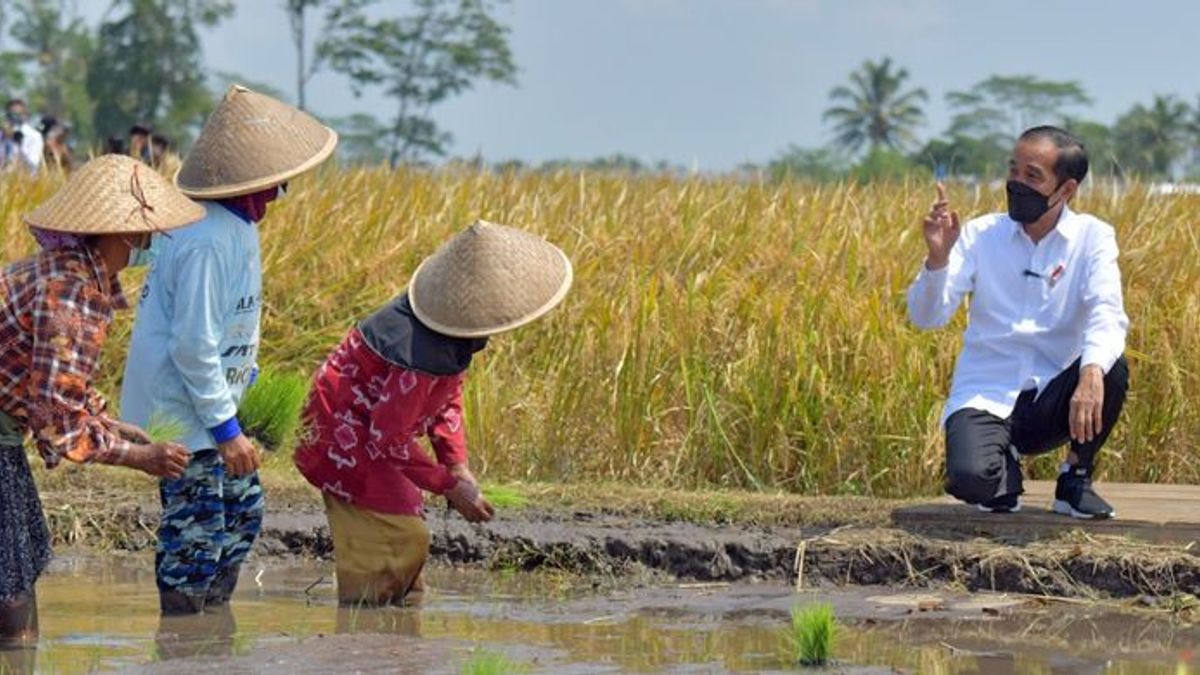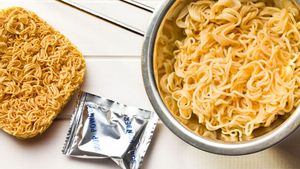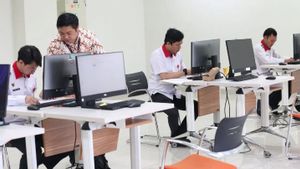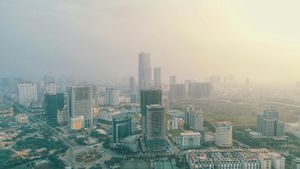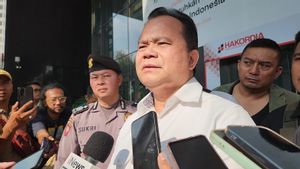JAKARTA - Indonesia's achievements regarding the food security system and self-sufficiency in food should be applauded. At least, for the last three years, domestic rice production has remained stable at 31.3 million tons. This year, the odds have even increased.
Referring to data from the Central Statistics Agency (BPS), only in the fourth month, rice stocks are already in the highest position compared to previous years, which reached 10.2 million tons.
This achievement, according to President Jokowi, cannot be separated from the massive infrastructure development in the agricultural sector that has been carried out since 2015.
"As far as I remember, we have inaugurated 29 large dams, and this year, a total of 38 dams will be completed again and by 2024 we will complete approximately 61 dams. Plus 4,500 reservoirs, and 1.1 million irrigation networks that we have built over the past 7 years," said Jokowi, as broadcasted on the Presidential Secretariat's YouTube account, Sunday (14/8).
Jokowi conveyed this after receiving a Certificate of Acknowledgment from the International Rice Research Institute (IRRI) for Indonesia's success in achieving rice self-sufficiency at the State Palace in Jakarta, Sunday (14/8).

In addition to infrastructure development, the government is also utilizing superior rice varieties, carrying out intensification and extensification so that Indonesia can achieve rice self-sufficiency with surplus rice production for the past three years.
"And if you ask where the goods are? Yes, they are in the community, in farmers, in restaurants, and also at Bulog. Plus some in the food industries," said Jokowi.
The President hopes that this achievement can be further increased in the next two to three years, so that Indonesia can become the largest rice supplier for the needs of the world community.
"We have to enter the export markets," he continued.
Even so, the government continues to seek strategic steps in terms of food security by not only relying on rice. There are many other types of food that can be developed on Indonesian soil.
Like Corn, the government has continued to boost corn production in the last seven years and the results are visible today.
“Seven years ago corn imports reached 3.5 million tons, today it's only 800 thousand tons. In sha Allah, we will not import corn again in the next 2-3 years. It's like rice, which we haven't imported for 3 years," Jokowi added.
Then, sorghum which has begun to be developed in Waingapu, West Nusa Tenggara. Based on the roadmap, the development target in 2023 is to increase the planted area to 30,000 hectares spread over 17 provinces with a production of 115,848 tons, assuming a province of 4 tons/hectare. The following year it increased again to 40,000 hectares with a production of 154,464 tons.
"This is an integrated work, working together, working together, not just for the ministry," added Jokowi.
Opportunity to Become a Rice Exporter
The Chancellor of the Bogor Agricultural University, Arif Satria, did not deny that the success of Indonesia's food security program was also supported by increased food diversification which was able to reduce rice consumption.
Over the last five years, rice consumption has decreased from 98 kilograms/capita/year in 2016 to 94.4 kilograms/capita/year in 2021. Going forward, this figure can still be lowered to 85 kilograms per capita per year according to the recommendations of the Hope Food Pattern.
The conditions must be balanced with increasing diversification of local carbohydrate food consumption, and increasing consumption of vegetables, fruit, nuts, and animal foods to maintain the nutritional quality of Indonesian people's food consumption.
"If the decline in rice consumption per capita according to the Hope Food Pattern can be realized, then Indonesia will become more food independent. It is even possible that in the long term Indonesia will be able to become a rice exporter that feeds the world," said Arif in his speech at the same event at the State Palace, Sunday (14/8).
The most important thing is that the intensification, extensification, and diversification of food based on local food must be successful, and farmers must be prosperous.

“It is also necessary to look for technological breakthroughs that are more visible for marginal lands such as swamp land, ex-mining land, tidal land, and land with high salinity. And, it is important to reduce the rate of conversion of productive paddy fields," he added.
Then, maximizing the reduction of food loss and food waste from production, post-harvest, transportation, logistics, to consumption at the consumer level is also an integral indicator in efforts to increase food availability.
"This is where precision agriculture is needed to reduce food loss which currently reaches around 9-11 percent and changes in consumer behavior to reduce food waste, which currently contributes up to 9 percent," he said.
According to him, to build a food system that is resilient requires 4 better approaches, namely better production, better nutrition, better environment, and better life. A resilient food system is not easily shaken by geopolitical dynamics, climate change by the threat of natural/non-natural disasters, and man-made disasters. "For that, we must have, first, good food planning at the national and regional levels as a step to anticipate shocks. Second, a strong food reserve and logistics system as our way to survive. Third, the ability to quickly recover after a shock," he said.
Big Achievement
On the same occasion, the Director General of IRRI, Jean Balie, also gave great appreciation. Indonesia is clearly an example, even though during the pandemic conditions that continued into the food crisis, Indonesia still managed to increase the level of production productivity and achieve a high level of self-sufficiency in food.
"This is the result of high technology adoption, good farmer training, as well as excellent extension performance and excellent cooperation between agencies and particularly between IRRI and the Indonesian government," Balie said.
Similarly, FAO Representative for Indonesia and Timor Leste, Rajendra Aryal, assessed that the award given by IRRI to the Indonesian government was a great achievement. Moreover, in the midst of the COVID-19 pandemic crisis and the instability of the global geopolitical situation.
"Of course, it's a big achievement. Almost no rice imports except for premium varieties. Corn imports have also stabilized. This is a major milestone toward a robust agricultural food system in the country. Congratulations to Indonesia," said Rajendra Aryal.
FAO is committed to continuing to assist Indonesia in providing the technical expertise needed to increase food production in the future.

“FAO stands ready to provide the technical expertise needed for better production, better health, a better environment, and a better life,” added Rajendra.
A millennial farmer from Bali, Agung Wedhatama hopes that this achievement can be a trigger for the government to continue to improve agricultural infrastructure. This includes the development of human resources so that the regeneration of farmers in Indonesia can emerge which can make Indonesia's food order stronger and more resilient.
"Of course, the most important thing is the development of agricultural technology, IoT (internet of things), and digitalization with smart farming so that we can compete with other market shares so that Indonesia can become a developed country in 2030-2040 with our demographic bonus," he explained. from presidentri.go.id, Sunday (14/8).
“In the future, the food issue will indeed become the most strategic issue in the world. You control the food, you control the people, you control the nation. As long as we can supply the surplus in our food, our country will be the strongest, prosperous and prosperous," added Agung.
Minister of Agriculture Syahrul Yasin Limpo in his statement said the award from IRRI was the biggest gift for the Indonesian people on the 77th anniversary of Indonesia's independence. "IRRI has recognized the strong agricultural and food systems and rice self-sufficiency that Indonesia has achieved in the last three years."
SEE ALSO:
The English, Chinese, Japanese, Arabic, and French versions are automatically generated by the AI. So there may still be inaccuracies in translating, please always see Indonesian as our main language. (system supported by DigitalSiber.id)
